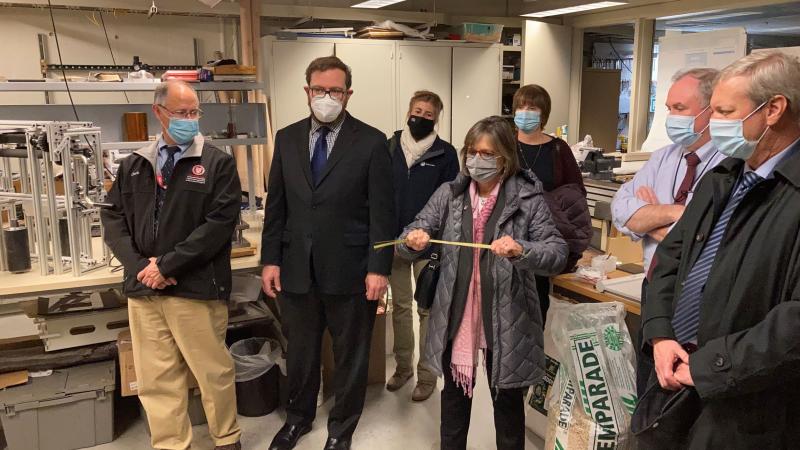Rensselaer Polytechnic Institute leads workshop to develop New York’s hemp industry as revolution in sustainable construction
January 26, 2022

Rensselaer Polytechnic Institute brought together academia, New York state government, and industry at a recent workshop to discuss the growing hemp industry and opportunities in New York.
The Seed to City Hemp Initiative combines Rensselaer expertise in design, engineering, and business to develop a holistic plan for a sustainable and economically viable hemp industry for New York.
The workshop included representatives from the Executive Chamber, New York State Assembly, New York State Agriculture and Markets, Empire State Development, the New York Farm Bureau, the Manufacturers Association of Central New York (MACNY), and Rensselaer Polytechnic Institute to discuss next steps for bringing the Seed to City Hemp Initiative to fruition. The group also toured several research facilities on the Rensselaer campus.
New York state launched the Industrial Hemp Agricultural Research Pilot Program in 2015, recognizing its potential impact on manufacturing, job creation, and the profitability of farms across New York tate. Since then, the State has joined with researchers, academics, businesses, and processors to develop strategies to advance research and grow the industry throughout the State. Today, the New York State Industrial Hemp Agricultural Research Pilot Program has nearly 800 authorized growers, and approximately 30,000 acres registered for growing industrial hemp.
“Rensselaer is pleased to be a partner in this exciting effort to develop and commercialize hemp as an industrial product,” said Robert Hull, Rensselaer acting vice president for research. “Rensselaer is home to world-class researchers and platforms focused on driving discovery and innovation in advanced manufacturing and the built environment. Rensselaer President Dr. Shirley Ann Jackson announced at President Biden’s virtual climate summit the creation of our Institute for Energy, the Built Environment, and Smart Systems, or EBESS. A major focus of this new Institute will be to create new processes and products that drive decarbonization of the construction industry, in this case by helping to incorporate industrial hemp into New York’s built infrastructure.”
“I’d like to thank the team at RPI for their hospitality,” said Assemblywoman Donna Lupardo, who chairs the NYS Assembly Agriculture Committee. “We were very impressed by the research being done to reduce carbon in the built environment through sustainable manufacturing practices using hemp fiber and hurd, the woody inner core of the hemp stalk. The opportunities for New York farmers, processors, and manufacturers are endless if we can concentrate our efforts to promote these uses of industrial hemp. In fact, many manufacturers will be able to retrofit existing operations to substitute hemp raw materials for their product lines.”
“It was my pleasure to join members of the RPI team, Assemblywoman Lupardo, and other industry and community leaders to see first-hand how industrial hemp can become a meaningful part of manufacturing and agriculture,” said MACNY President and CEO Randy Wolken. “It was eye-opening to learn more about its environmental benefits and wide-ranging uses. There is real opportunity for industrial hemp to become a strong factor in the future of sustainable agriculture and manufacturing practices.”
Industrial hemp is a botanical class of Cannabis sativa cultivars grown specifically for industrial or medicinal use. Hurd makes up 70% of the plant by volume and essentially can be used the same way as wood chips. Hemp fiber is among the strongest in the plant kingdom and as strong as glass fiber on a per weight basis. It can be refined into a variety of commercial items, and it has great potential for the construction industry.
The use of hemp composites has the potential to reduce the carbon footprint of the built environment. Rensselaer researchers, including Alexandros Tsamis, assistant professor of architecture and associate director of the Center for Architecture Science and Ecology (CASE), and Dan Walczyk, professor of mechanical engineering and director of the Manufacturing Innovation Center (MIC), presented an overview of agricultural/horticultural, processing, and manufacturing aspects of going from hemp plant to construction products.
The building and construction industries have embraced the environmental benefits of both hemp fiber and hurd. However, there are technical hurdles that need to be overcome, including the lack of effective stalk processing methods and equipment that does not damage the fiber, lack of material property data, lack of manufacturing methods and, crucially, lack of higher value end-products for the construction industry.
A Rensselaer team is developing several cost‐effective hemp processing technologies that separate fiber and hurd without adversely affecting their mechanical properties. They are also developing a sustainable degumming method and new hemp bio-composite processing methods.
The Rensselaer team has determined that processing facilities will be required to receive the plants after they are harvested. They are proposing the development and deployment of hemp “barns” that would serve as multifunctional processing facilities for hemp. Strategically distributed between farming activities and end-product manufacturing centers, a network of processing facilities would help reduce the carbon footprint of the hemp industry and optimize its supply chains. Made out of hemp, the barn building would showcase high-value hemp composite materials for construction and would effectively demonstrate energy savings in buildings.
The Rensselaer researchers are also developing a hemp‐based rebar reinforcing technology for cement. They are addressing the issues that occur due to steel corrosion by replacing steel with a natural fiber-reinforced thermoplastic rebar. Preliminary results have shown a significant reduction in carbon footprint, as well as strength characteristics comparable to steel. The project aims to extend the lifetime of cement‐based buildings and infrastructure.